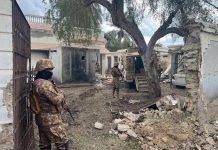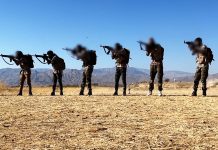Eid is a joyous religious festival, but families of those who have been forcibly disappeared in Balochistan even spend the Eid protesting for their loved ones. Today, protests are being held in Quetta, Turbat, Khuzdar, Gwadar, and Islamabad for the recovery of forcibly disappeared persons. A campaign is also running on Twitter to express solidarity with these families on Eid day.
In Khuzdar, Saira Baloch is protesting for the recovery of her brothers, Asif and Rasheed, who have been missing for five years. In Gwadar, Rukhsana Baloch is protesting for her brother Azeem Dost, who has been missing for ten years. Mama Qadeer, who has been sitting in the protest camp for last 5000 days, is also spending Eid day in protest to end enforced disappearances in Balochistan.
Enforced disappearances have severely affected thousands of families in Balochistan, psychologically and economically. Religious and national festivals in Balochistan are also spent in protest, but instead of betterment the cases of enforced disappearances are on rise and many have been killed in fake encounters.
A few days before Eid, the Human Rights Commission of Pakistan expressed concern over enforced disappearances in Balochistan in a fact-finding report on human rights violations called ‘Balochistan’s struggle for hope’. The report said that the state is using enforced disappearances on a large scale to suppress opinion and called for immediate halt in establishment’s interference in Balochistan’s political affairs. The report called for legislation to hold perpetrators of enforced disappearances accountable and ensure the safety and independence of those associated with the media.
On the orders of the Chief Justice of Islamabad High Court, Athar Minullah, the commission on enforced disappearance of Baloch students, headed by Sardar Akhtarmengal, completed its report and submitted it to the Islamabad High Court in February 2023. The report termed enforced disappearances in Balochistan a wound that is continuously weakening the existence of Pakistan. It also highlighted that Baloch students are treated with racial discrimination in various universities of Pakistan. The commission report clarified that state institutions are involved in the forced disappearance of Baloch students, violating Article 55 of the United Nations Charter.
Despite passing the Enforced Disappearance Bill, the Parliament has failed to stop enforced disappearances and custodial killings of missing persons in Balochistan. This reveals the reality of the so-called supremacy of the Pakistani Parliament in solving the Baloch problem. Instead of solving the problem by following the fact-finding report of the Human Rights Commission of Pakistan and the recommendations of the Judicial Commission, the Parliament and Judiciary are playing the role of silent spectators.






























